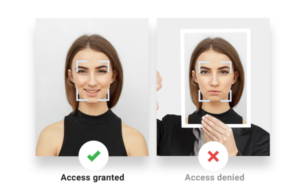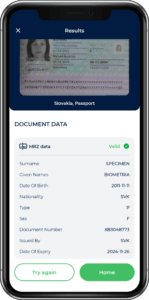
Innovatrics Is Once Again a Luminary in the Latest Prism Report for Government Services
The flagship project with remote identity verification by Innovatrics put government services into the smartphones of millions of ...
Read moreThe advent of home-sharing platforms has revolutionized travel and accommodation. These platforms offer convenience and flexibility by allowing travelers to book stays online while providing homeowners an opportunity to monetize their spaces. With the rise of this digital marketplace, the need to ensure security, trust, and transparency has become critical. At the heart of addressing these challenges lies the implementation of digital identity verification solutions, which ensure users are who they claim to be.
This exploration dives into how these technologies safeguard transactions, the innovative tools driving the process, and their impact on user experience and platform credibility.
Online platforms thrive on trust, especially in the sharing economy. Whether renting out a home, sharing a ride, or engaging in peer-to-peer commerce, participants need to feel confident that the person on the other side is legitimate. This is where digital identity verification solutions step in.
These solutions use advanced technologies to authenticate identities, reducing the risks of fraud and unauthorized transactions. For home-sharing platforms, such as Airbnb or Vrbo, this means hosts can feel secure about who they welcome into their homes, and guests can trust their accommodations are legitimate.
The rapid growth of online interactions during the pandemic highlighted the vulnerabilities in traditional verification methods. As the digital economy expands, with the global digital identity solutions market projected to grow at a rate of 16% from 2025 to 2030, identity verification solutions have become indispensable tools for building trust and ensuring security.
Biometric technologies have become a must-have in identity verification. By leveraging unique physical traits, biometrics offers a secure and efficient way to verify identities, elevating safety and convenience on home-sharing platforms.
Facial recognition technology analyzes distinct facial features to confirm identity. In the context of home-sharing, this method can be employed during registration or transaction verification. Its touchless nature adds a layer of convenience, making it a preferred choice for users seeking a seamless experience.

Fingerprint scanning, another popular biometric approach, identifies users by analyzing unique fingerprint patterns. This technology ensures accuracy and security, reducing the chances of fraud. For home-sharing platforms, integrating fingerprint scanning can enhance safety measures while maintaining ease of use for participants.
A cutting-edge addition to the biometric family, mobile palm verification uses the intricate vein patterns and contours of an individual’s palm for authentication. This contactless method is particularly appealing for its precision and resistance to forgery. Its adoption on home-sharing platforms signals a move toward more advanced, user-friendly security solutions.

While biometrics like facial recognition and fingerprint scanning are incredibly secure, their effectiveness relies on ensuring the user is physically present during the verification process. Liveness detection technology is designed to counter spoofing attempts by verifying that the biometric data originates from a live person rather than a photo, video, or fake representation.
Liveness detection can involve motion-based tests, such as asking users to blink, smile, or turn their heads during facial recognition scans. Alternatively, advanced methods use AI to analyze subtle cues like skin texture or depth to confirm the presence of a real person. Incorporating liveness detection ensures that even sophisticated fraud attempts are thwarted, making it an indispensable layer of security for home-sharing platforms.
While biometrics plays a critical role, document verification technologies are equally vital for ensuring identity legitimacy. These tools authenticate identification documents such as passports, driver’s licenses, and government-issued IDs, forming the backbone of digital identity verification processes.
Optical Character Recognition (OCR) technology, powered by machine learning algorithms, extracts and analyzes data from documents with remarkable accuracy. By scanning identification documents, OCR automates the verification process, minimizing errors and improving efficiency. This makes document verification an essential tool for platforms to streamline their user onboarding processes.
Through advanced document verification systems, home-sharing platforms can confidently authenticate users, enhancing the trustworthiness of their services while protecting against fraud.

User experience is paramount in the competitive home-sharing market. According to one global study, 29% of all businesses deploy identity verification solutions due to customer demands and improvement of their satisfaction levels.
Platforms that prioritize simplicity in their verification methods often see higher user satisfaction. By utilizing technologies like biometric scans and OCR-based document verification, the process becomes quick, accurate, and hassle-free. This not only enhances the user experience but also positions the platform as a reliable choice in the market.
Guests need assurance that their chosen accommodation is safe and legitimate. Similarly, hosts want to feel confident about the individuals entering their homes. A seamless identity verification process bridges this gap, fostering transparency and mutual trust.
Digital identity verification solutions offer a host of benefits, particularly in bolstering security. By implementing these technologies, home-sharing platforms can protect their users while enhancing their reputation.
One of the primary advantages of identity verification is fraud prevention. By confirming user identities, platforms significantly reduce the likelihood of fraudulent activities such as identity theft, fake listings, or unauthorized transactions.
With robust identity verification measures in place, user data is handled securely, ensuring privacy and confidentiality. This is critical in building user trust and complying with data protection regulations.
Home-sharing platforms that prioritize security through advanced ID checks and verification solutions position themselves as trustworthy and professional. This not only attracts a loyal customer base but also strengthens the platform’s reputation in the competitive marketplace.
The integration of digital identity verification solutions has transformed how home-sharing platforms operate. These technologies streamline the verification process, enhance user confidence, and create a culture of transparency.
As the industry evolves, the adoption of advanced methods, such as biometric verification and document authentication, will continue to shape safer and more efficient experiences for both hosts and guests. Platforms that embrace these solutions are better equipped to meet the challenges of the digital age while delivering exceptional user experiences.
In an interconnected world, where trust is a currency, digital identity verification solutions are no longer optional—they are essential. From ID scan verification to biometric technologies and OCR-powered document checks, these tools form the cornerstone of a secure and thriving home-sharing ecosystem.
Ready to bring advanced biometric technology to your platform? Partner with Innovatrics to integrate trusted identity verification solutions that protect your users and elevate their experience.